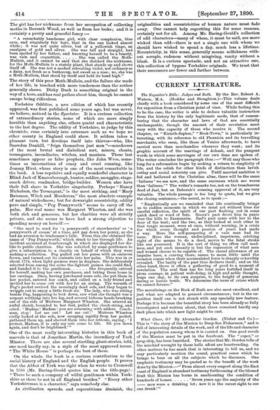CURRENT LITERATURE.
The Expositor's Bible : Judges and Ruth. By the Rev. Robert A. Watson, MA. (Hodder and Stoughton.)—This volume deals chiefly with a book considered by some one of the most difficult for exposition from a Christian point of view. While feeling this to be the case, the writer is able to deduce valuable instruction from the history by the only legitimate mode, that of remem- bering that the character and laws of God are essentially unchangeable, though the amount of their revelation must vary with the capacity of those who receive it. The second Chapter, on "Kiriath-Sepher," "Book-Town," is particularly in- teresting, with its reference to old Phcenicia and its travelling merchants, who seem, like those of Venice afterwards, to have carried more than merchandise wherever they went ; and its graphic account of the marriage of Achsah, and the pungent words in which some marriages of our own time are spoken of. The writer concludes the paragraph thus :—" Well may those who long for a reformation begin by seeking a return to simplicity of life, and the relish for other kinds of distinction than lavish outlay and social notoriety can give. Until married ambition is fed and hallowed at the Christian altar, there will be the same 'failures' we see now, and the same successes which are worse than 'failures.' " The writer's remarks too, not on the treacherous deed of Jael, but on Deborah's seeming approval of it, are very valuable. The whole passage is too long to quote, but we give the closing sentences,—the moral, so to speak :— "Emphatically are we -reminded that life continually brings us to sudden moments in which we must act without time for careful reflection, the spirit of our past flashing out in some quick deed or word of fate. Sisera's past drove him in panic over the hills to Zaanannim. Jael's past came with her to the door of the tent; and the two, as they looked at each other in that tragic moment, were at once, without warning, in a crisis for which every thought and passion of years had made a way. Here the self-pampering of a vain man had its issue. Here the woman, undisciplined, impetuous, catching sight of the means to do a deed, moves to the fatal stroke like one possessed. It is the sort of thing we often call mad- ness, and yet such insanity is but the expression of what men and women choose to be capable of. The casual allowance of an impulse here, a craving there, seems to mean little until the occasion comes when their accumulated force is sharply or terribly revealed. The laxity of the past thus declares itself; and on the other hand, there is often a gathering of good to a moment of revelation. The soul that has for long years fortified itself in pious courage, in patient well-doing, in high and noble thought, leaps one day,. to its own surprise, to the height of generous daring or heroic truth. We determine the issue of crises which we cannot foresee."
The moralisings on the Book of Ruth are also most excellent, and just what are adapted to present circumstances; but in the ex- position itself one is not struck with any specially new feature. Perhaps it is because the beautiful story has been already so fully investigated and written about, that there remained hardly any dark place into which new light might be cast.


































 Previous page
Previous page